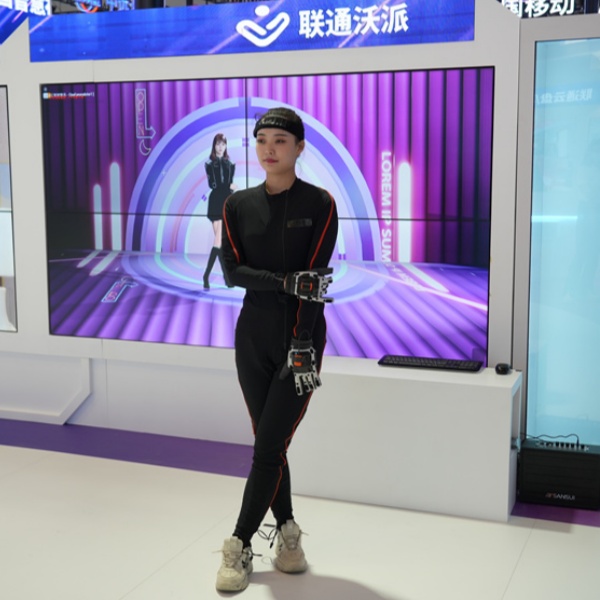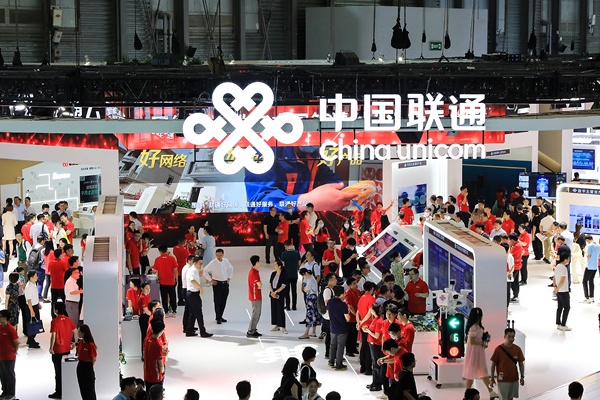
- Home
- Media Center
-
Events
- Wuzhen Summit
- Regional Forums
- Practice Cases of Jointly Building a Community with a Shared Future in Cyberspace
- World Internet Conference Awards for Pioneering Science and Technology
- The Light of Internet Expo
- Straight to Wuzhen Competition
- Global Youth Leadership Program
- WIC Distinguished Contribution Award
- Membership
- Research & Cooperation
- Digital Academy
-
Reports
- Collection of cases on Jointly Building a Community with a Shared Future in Cyberspace
- Collection of Shortlisted Achievements of World Internet Conference Awards for Pioneering Science and Technology
- Reports on Artificial Intelligence
- Reports on Cross—Border E—Commerce
- Reports on Data
- Outcomes of Think Tank Cooperation Program
- Series on Sovereignty in Cyberspace Theory and Practice
- Other Achievements
- About WIC
- 中文 | EN

Telecom firms strut latest LLM stuff

China Unicom showcases its motion capture technologies and digital human models during an expo in Shanghai in May. [Photo/China Daily]
Immense data, rich scenario edges in country still require further exploitation
At a bustling exhibition center in Fuzhou, Fujian province, visitors flock to a captivating demonstration by China Unicom. Here, tea enthusiasts can customize their tea orders via a tablet, specifying the type, quantity and packaging. Within minutes, robotic arms precisely select, seal, engrave and deliver the tea to a storage unit — an entirely automated process. This human-free production line exemplifies the remarkable advancements in artificial intelligence and automation.
By leveraging extensive data analysis and advanced AI large language models, companies can automate workflows, thus reducing labor costs and enhancing production efficiency, said an employee of China Unicom at the expo.
This innovation is part of the telecom carrier's in-house LLM, which is roughly translated as Yuanjing, designed to empower various sectors like clothing, automaking and equipment manufacturing with robust AI capabilities.
This initiative reflects a broader trend among China's top telecom operators — China Unicom, China Mobile and China Telecom — which are aggressively investing in AI. As AI technology rapidly evolves, these giants are enhancing their capabilities in computing power, data and applications, thereby fueling a new wave of industrial modernization, triggering innovation in areas such as 5G, industrial internet and smart manufacturing.
For instance, China Unicom's "AI plus" strategy aims to build LLMs across more than 10 industries — such as equipment manufacturing and light textiles — to boost efficiency and quality. Additionally, they focus on strengthening internal security to safeguard this new industrial landscape.
China Mobile has introduced its Jiutian AI model, collaborating with government agencies and enterprises to co-develop over 20 industry-specific AI models. These models span a wide range of applications including network management, customer service, smart home, public services, transportation, healthcare and industrial sectors.
In another engaging showcase, a dual-armed six-axis robot prepares and serves coffee, even cleaning the cup afterward — a testament to the fusion of networking, computing power and AI. This robot integrates the latest technologies in network, computing and AI. Based on data accumulation and intelligent algorithms, it has developed multimodal capabilities to meet needs in fields such as entertainment, household chores and family care, China Mobile said.
The surge in digital innovation is underpinned by robust data infrastructure. According to a report released by the National Data Bureau, China's data production reached 32.85 zettabytes (1 ZB equals approximately 1 trillion gigabytes) in 2023, a 22.44 percent year-on-year increase.
To harness the full potential of these data elements, the NDB, along with other departments, launched the "Data Elements plus" three-year action plan (2024-26). The first batch of 20 typical application cases spans industries like industrial manufacturing, modern agriculture, trade circulation and transportation, showcasing best practices in data utilization.
However, the immense data and rich scenario advantages in China still need further exploitation. The National Data Resources Survey Team's latest report highlighted challenges such as the high total data volume but insufficient effective supply, the need for proactive planning of computing power, and the improvement of diverse data circulation models.
Multiple departments have expressed their commitment to deepening reform of market-based allocation of data elements, optimizing digital infrastructure and unlocking the value of data elements.
Liu Liehong, head of the NDB, emphasized the need for innovation in data infrastructure. He highlighted efforts to promote data resource property rights, circulation, transaction, benefit distribution and security governance. The goal is to build a dynamic, categorized, and hierarchical data resource management system that facilitates data development, openness and efficient flow.
Wang Jiangping, deputy minister of industry and information technology, outlined plans to accelerate the deployment of 5G and gigabit optical networks, advance 6G research and expand intelligent computing infrastructure. This includes enhancing interconnectivity, promoting high-quality development of the industrial internet, and integrating AI and data elements to empower new industrialization.
Jian Qin, general manager of China Unicom, said the company focuses on building a digital foundation of computing and networking, with intelligent data usage and comprehensive security, to support economic and social transformation.
In recent years, China Unicom has significantly improved its network capabilities, supporting low-latency industrial control applications with extensive 5G coverage and deepening 5G private network applications.
By upgrading intelligent computing supply, it ensures reliable computing power for new industrialization. The company's intelligent computing layout and its advanced computing scheduling platform offer diverse computing resources, driving forward intelligent applications that inject innovation into industrialization, Jian said.
China Unicom's Yuanjing LLM, for instance, is notable for being industry-specific, customizable and secure. Although AI model implementation in industrial fields is still exploratory, China Unicom fosters an open, collaborative innovation ecosystem, providing computing power and algorithms while partners contribute data and scenarios.
This cooperative approach has led to significant advancements across 10 sectors, including clothing, automotive, equipment manufacturing, warehousing, logistics, power, steel, mining, light textiles, ports and chemicals, experts said.

Visitors flock to the China Unicom booth during the Mobile World Congress in Shanghai in June 2023. [Photo/China Daily]
For example, Yuanjing LLM dramatically enhances design efficiency at a Hangzhou garment factory. Previously, a skilled designer could create three to four clothing designs per day, taking two days to finalize one. Now, the AI model generates designs in just three seconds, including visualizing the fit, vastly boosting designers' productivity, China Unicom said.
In home appliance manufacturing, Yuanjing LLM improves quality control through AI-augmented visual inspections, reducing defect rates by 50 percent. In port operations, China Unicom's AI applications, developed with a port company in Nanjing, Jiangsu province, enhance safety and efficiency across over 30 operational scenarios, significantly reducing accident rates.
China Mobile Chairman Yang Jie also highlighted the company's AI journey since 2013, culminating in the largest single intelligent computing center among global telecom operators, with a total computing power of 17 exaflops. An exaflop is a measure of performance for computers that can calculate at least 1 quintillion floating point operations per second.
Chen Yili, deputy chief engineer at the China Academy of Information and Communications Technology's Cloud Computing and Big Data Research Institute, said: "Algorithms, computing power and data are the three pillars that support AI development, with computing power serving as the driving force for AI advancement. As large-scale AI models now have 1 trillion parameters, demand for computing power currently exhibits exponential growth. The enhancement of computing power not only accelerates the training speed of large-scale AI models, but is also a crucial factor for the rapid iteration and widespread application of AI technology."
With over 10,000 AI plus projects across sectors like governance, industry and healthcare, China Mobile said its LLMs significantly contribute to digital transformation.
Moreover, China Mobile has established the Jiutian Research Institute, fostering a team of 2,000 AI experts. They aim to produce top-tier AI technological innovations, efficient industry integration platforms and high-quality AI+ applications to further empower the digital economy.
Xiang Ligang, director-general of the Information Consumption Alliance, a telecom industry association, said the initiatives of China's leading telecom operators illustrate a transformative approach to industrial modernization through AI and data integration.
As they continue to innovate and collaborate across various sectors, the potential for AI-driven efficiency and productivity gains appears boundless, representing a significant step toward a smarter, more automated future, Xiang said.
Ke Ruiwen, chairman of China Telecom, stated, "We will actively participate in the construction of the national data infrastructure, providing functions such as data confirmation and registration, data fusion computing and trusted data spaces, to support data aggregation, circulation and utilization."
This concerted effort by government bodies and enterprises marks a significant step toward realizing the full potential of data elements and AI, driving China's digital economy forward.

The World Internet Conference (WIC) was established as an international organization on July 12, 2022, headquartered in Beijing, China. It was jointly initiated by Global System for Mobile Communication Association (GSMA), National Computer Network Emergency Response Technical Team/Coordination Center of China (CNCERT), China Internet Network Information Center (CNNIC), Alibaba Group, Tencent, and Zhijiang Lab.





